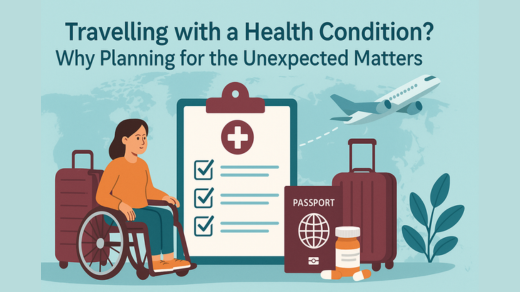Travelling with a Health Condition? Why Planning for the Unexpected Matters

When planning a trip abroad—especially with a pre-existing health condition—most of us focus on itineraries, medication, and insurance. But one topic that’s often overlooked is what would happen in the event of a medical emergency or sudden death while overseas. It’s understandably uncomfortable to consider, yet having a plan in place can provide peace of mind to you and your loved ones, and offer clarity during one of life’s most overwhelming moments.
Losing someone while they are travelling or living abroad is devastating. In the midst of grief, navigating foreign systems and legalities can feel impossible. That’s why it’s crucial to be prepared. Below, we outline the steps to take if the worst should happen, the importance of making preparations ahead of time, and the key resources every traveler and their loved ones should keep accessible.
What to Do if a Loved One Passes Away Abroad
1. Notify Local Authorities Immediately
The first step is to contact the local police or medical personnel to officially declare the death. This will allow for the issuance of a local death certificate—a document you’ll need for all other steps. Authorities can also connect you with your nearest embassy or consulate.
2. Contact the Nearest Embassy or Consulate
Embassies and consulates are invaluable in these situations. They can guide you through the legal and logistical processes, help notify the appropriate agencies back home, and assist in gathering the necessary documents for repatriation—like a local death certificate, embalming certification, and any public health clearances required for transportation.
3. Reach Out to a Repatriation Service
Specialist repatriation providers are available to coordinate the complex logistics of returning a loved one home. They work closely with funeral directors, airlines, and authorities to ensure everything is handled respectfully and efficiently. If you need help, contact Global Funeral Repatriation, who are able to support worldwide repatriation.
4. Inform the Insurance Provider
If your loved one had travel insurance, notify the insurer as soon as possible. Many policies include repatriation coverage and can significantly reduce financial burdens. Some plans may specify particular service providers, so review the policy carefully to avoid issues later. It is important to ensure that you are as transparent as possible with your travel insurance provider. While there might be personal reasons you might feel uncomfortable sharing all medical information, this helps ensure that you will be covered if the worst should happen.
5. Prepare All Necessary Documentation
Essential paperwork includes the death certificate, the deceased’s passport, and possibly other legal documents. In some countries, translations may be required. The embassy and repatriation team can provide a comprehensive checklist to ensure nothing is missed. You should also consider keeping a copy of the insurance documents as well as a copy of your birth certificate with a trusted friend just as insurance. This will help them with securing the necessary paperwork if the worst should happen and if they aren’t next of kin or directly related, this may also help them prove themselves as a trusted party.
The Value of Being Prepared—Especially with a Health Condition
While no one wants to dwell on worst-case scenarios, having a plan in place makes a world of difference for those left behind. If you have a medical condition, are undergoing treatment, or are travelling to a remote destination, prearranging certain details can help ensure your wishes are respected—and relieve loved ones from the stress of decision-making under duress.
A plan might include:
- Ensuring travel insurance includes comprehensive medical and repatriation cover
- Storing key documents and contacts in one accessible place
- Sharing those details with a trusted friend or relative
- Understanding the costs involved and making necessary financial arrangements
- Clearly communicating your wishes around end-of-life care or repatriation
Key Contacts and Resources to Keep on Hand
✅ Local Embassy or Consulate Contacts
Save contact details for embassies in the countries on your itinerary. The UK Government’s Bereavement Packs for deaths abroad are an excellent resource: gov.uk/government/collections/death-abroad-bereavement-packs
✅ Insurance Information
Keep a copy of your policy, claim numbers, and the insurer’s emergency contact information. Ensure a trusted contact at home has access to this too.
✅ Repatriation Provider Details
Do your research ahead of time and choose a provider whose details you can easily access if needed. Again, you might not want to consider this but just having some details can be reassuring. Funeral directors often have a trusted partner if you want to get a more reliable reference.
✅ Legal and Medical Documents
Bring copies of important documents—like a will, power of attorney, and medical records—and store them safely, either physically or digitally.
✅ Emergency Contact List
Have a list of key family and friends who can be quickly contacted. Designate a lead communicator to avoid confusion during a crisis. They should also know where your documents are stored in the event of an emergency.
✅ Tell Us Once
This UK government service streamlines the process of informing multiple departments about a death, including if it occurs abroad. Learn more : gov.uk/after-a-death/organisations-you-need-to-contact-and-tell-us-once
While these conversations are hard, having them before you travel can bring a sense of comfort and control. With thoughtful planning and the right support, you can ensure that even in the most challenging times, you and your loved ones won’t face them alone.




